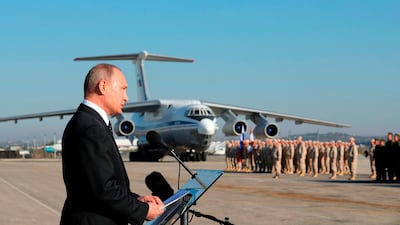Russia’s steps towards the US and Israel as well as Saudi Arabia and the UAE come in parallel with Moscow's growing hostility towards Iran and its allies in Syria. The discord could be temporary or permanent, depending on how much Russian and Iranian priorities diverge. What is certain today is that the US and Russia will both keep their military bases in Syria with mutual consent and will be present in the country's post-conflict reconstruction and transition.
European powers have been marginalised in this context, despite all pretences. On the Iran nuclear deal, the Europeans are resisting US pressures and holding on to the agreement that the Trump administration withdrew from. As a result, Europe is now a very important partner for the Iranians.
By contrast, Russia is growing in importance for the UAE and Saudi Arabia, Iran's rivals. Last week, the two Gulf states launched a "strategy of resolve" for bilateral integration while Russia and the UAE recently signed a strategic partnership agreement.
New partnerships are emerging among Russia, the US and the Arab Gulf states, while tensions are emerging in the relationship between Russia, Iran and Hezbollah. Iran, which is also growing distrustful of Bashar Al Assad, is in serious difficulty along with its proxies and allies because of the new US policy of economic strangulation and new Russian and Israeli strategies in the region.
The recent deal in the Syrian south has made it clear that Russian and Israeli interests converge when it comes to keeping Iran and its allies away from the occupied Golan Heights, which Israel says it will never return to Syria. Yet the Russian guarantees on this were deemed insufficient by the Israelis.
During a visit to London, Israeli Prime Minister Benjamin Netanyahu said there needs to be a new approach in Syria because “Israel will not tolerate Iranian military entrenchment in Syria against Israel. The consequences are not merely for Iranian forces there but the Assad regime as well.”
He added: "I think Assad should take the following seriously. Now that the war with ISIS is over and [Mr Al Assad] has called on Iran and allows it to attack Israel from the territory of Syria, his regime is no longer safe."
This suggests Israel has protected the Assad regime and is willing to continue to do so on the condition that the Syrian leader unties the Iranian cord. This is part of what worries Iran – that Mr Al Assad would be pressured to request the withdrawal of Iranian troops, advisers and Hezbollah and thwart Tehran’s project for permanent deployment.
Iran is concerned by Israel’s strategy to roll back an Iranian presence in Syria, unless Tehran provides clear guarantees it would accept the model of southern Syria throughout Syrian territory.
________________________
Read more from Raghida Dergham:
Iran's main card is one of subversion – but will it play it?
Syria offers an arena for US-Russian cooperation
Trump's nuclear decision should not hinder a greater vision for the Arab region
________________________
In this context, Iran is upset by Russia’s new strategy, which appears to accept Israeli and US pressures for Iran and its proxies to leave Syria. Indeed, some Iranian press reports even speak of Russian "betrayal".
Russian President Vladimir Putin this week said that large-scale military operations in Syria are winding down. He added: “Our military is there to ensure Russia's interests in an important region of the world. They will remain there as long as Moscow finds it reasonable, in accordance with its international commitment.”
Russia will continue to maintain its Hmeimim airbase and naval facility at Tartus in Syria, even after it fully ends its military operations in the country and exits in accordance with an implicit agreement with the Americans.
Iran’s most likely response will be to remain patient, wait things out and rein in the impulses of its Revolutionary Guard Corps to avoid self-destructive mistakes. The majority of observers therefore predict Iran will accept a form of de-escalation with Israel in Syria and with the US on the nuclear issue.
US President Donald Trump has said the goal of his new Iran strategy is to force the regime to change its behaviour rather than advocate regime change. To this end, he wants the Europeans, Russia and China to assume their responsibilities to push Iranian leaders towards a new deal that addresses the shortcomings of its precursor.
But if Iran refuses to co-operate, especially regarding its ballistic missile programme and regional military expansionism, Mr Trump has vowed to impose unprecedented economic sanctions, which could lead the regime to implode without the need for foreign military intervention.
Mr Trump is now preoccupied with preparations for his summit with North Korea’s leader in Singapore on Tuesday, while the world watches anxiously. Some countries such as Iran, which has had longstanding nuclear ties with Pyongyang, fear a breakthrough and accord between the two leaders. Mr Al Assad – who reportedly intends to visit North Korea to meet with Kim Jong-un – will also be watching.
Any agreement between Mr Trump and Mr Kim could have important implications for Tehran and Damascus. Russia, China, South Korea and Japan are also closely following the historic meeting.
As for the Gulf countries, the fundamental strategy of Saudi Arabia and the UAE is to maintain an alliance with the US and co-operation with Russia. This approach is wise because instead of ignoring Russia, it builds on both sides’ desire to improve political co-operation on key regional and bilateral issues.
Meanwhile the strategy of resolve for Saudi-Emirati integration, signed last Thursday in Jeddah, will have a significant impact on Gulf and Arab policy and the region and could push other powers to seek integration on everything from the economy and human capital to politics, security and defence.


